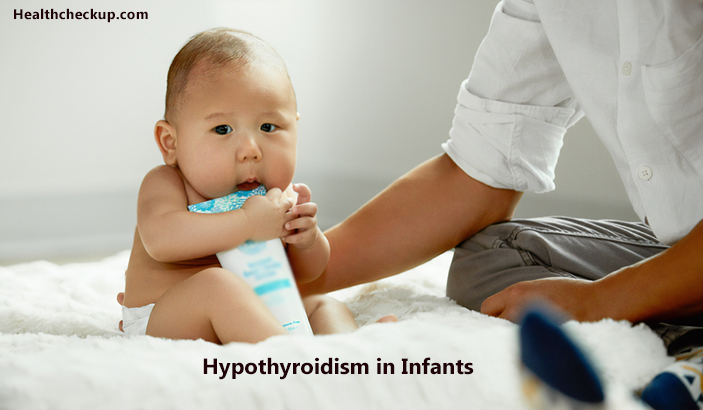What Is Hypothyroidism?
The thyroid gland is present in the neck. It consists of two lobes. The thyroid gland secretes two hormones i.e. triiodothyronine and thyroxine. These thyroid hormones are essential for various metabolic functions inside the human body. These hormones also play an important role in digestion, heart function, and brain and bone development. Levels below or above the normal of these two hormones may lead to various health problems. When the thyroxine hormone is significantly above the normal levels, the condition is termed hyperthyroidism or thyrotoxicosis. When the thyroid gland secretes too little or no thyroxine hormone, the condition is termed hypothyroidism. Hypothyroidism is found in infants, children, and adults.
What Is Hypothyroidism In Infants?
When the thyroid gland of infants does not secrete or secretes a little amount of thyroxine, the condition leads to hypothyroidism in infants. The reasons for this are many. Temporary disorders are the more common cause as compared to congenital hypothyroidism. Preterm infants are at more risk for hypothyroidism as compared to full-term infants. Hypothyroidism in infants may either be by birth or acquired after birth.
What Are The Causes Of Hypothyroidism In Infants?
There are various causes of hypothyroidism in infants. Some causes are present at the time of birth while other causes are acquired a few weeks after birth.
Following are various causes of hypothyroidism in infants;
Agenesis
This condition is characterized by the complete absence of the thyroid gland. Thyroid follicular cell precursors fail to survive to lead to thyroid agenesis.
Ectopia
In this condition, the thyroid tissue does not develop at its normal position in the neck. This condition is caused due to arrest of the migration of the thyroid tissue from the sublingual position to the front part of the trachea.
Secondary And Tertiary Hypothyroidism
Hypothalamus releases thyrotropin-releasing hormones. This hormone then stimulates the anterior pituitary gland to release the thyroid-stimulating hormone. This thyroid-stimulating hormone stimulates thyroxine synthesis from the thyroid gland. Inadequate stimulation provided to the thyroid gland by a thyroid-stimulating hormone is termed as secondary hypothyroidism while inadequate stimulation by thyrotropin-releasing hormone stimulates the production of the thyroid-stimulating hormone is termed as secondary hypothyroidism.
Maternal Antithyroid Antibodies
In some cases, the maternal antithyroid antibodies transfer to the fetus through the placenta. This may inhibit thyroid function in the fetus. This results in hypothyroidism at birth.
Other Causes
Other causes of hypothyroidism in infants include Pendred’s syndrome and genetic conditions.
What Are The Symptoms Of Congenital Hypothyroidism?
Most of the infants do not present any symptoms. The condition is detected during normal screening. Symptoms, when present, maybe;
- Prominent tongue
- Puffy face
- Constipation
- Dry skin
- Hoarse cry
- Poor feeding
- Excessive sleeping
- Prolonged jaundice
- Umbilical hernia
- Hypothermia
- Bradycardia
What Is The Prevalence Of Congenital Hypothyroidism?
The worldwide prevalence of congenital hypothyroidism is 1 in 1300 to 1 in 4000 births. Females and infants with gestational age >40 weeks are at increased risk of developing this condition. Differences in the incidence of this condition in different areas of the world may be due to iodine deficiency or the type of screening methods used.
How Congenital Hypothyroidism Is Diagnosed?
Congenital hypothyroidism is diagnosed through the following methods;
Preliminary Examination
Through the preliminary examination of the infant is done when hypothyroidism is suspected.
Mother’s History
Diet, medication history, and medical history for an autoimmune disease of the mother are also evaluated.
Laboratory Tests
laboratory tests such as T4 and TSH levels confirm the presence of hypothyroidism.
Thyroid Scan
Thyroid scan agenesis or ectopic condition is also done to analyze the cause of congenital hypothyroidism.
What Are The Treatment Options For Congenital Hypothyroidism?
As soon as hypothyroidism is confirmed, thyroxine replacement therapy should be started. The dose given is 8-10 mcg/kg/day. The tablet is crushed and mixed with a few milk drops. It is then given to the infant just before the feed. The therapy should not be given with iron or calcium supplements as this may reduce the absorption of thyroxine.
What Are The Follow-up Guidelines For Congenital Hypothyroidism?
The follow-up guidelines during the thyroxine replacement therapy are;
- Follow-up should be done at a regular interval, the first follow-up after two weeks and the second after six weeks. Later, the follow-up should be every 2-3 months for the first year.
- At each follow-up visit, a thyroid function test should be done and the dose may be adjusted if required.
- Developmental milestones should be closely monitored.
- Hearing tests of the infant should also be conducted.
How Can Congenital Hypothyroidism Be Prevented?
For pregnant women diagnosed with thyroid cancer, if they take radioactive iodine, it may destroy the thyroid gland in the developing fetus. Such infants should be critically monitored for any sign of hypothyroidism. Taking iodine-supplement salts during pregnancy may also reduce the risk of hypothyroidism in infants.

Rohit Jain is an IPR Specialist and Medical Content Writing Expert. For over a decade, he has written several articles in the areas of female infertility, Erectile dysfunction, hemangioma, cervical cancer, monoclonal gammopathy of undetermined significance, mononucleosis, mitral valve disorder, nerve sheath tumor, shin splints, mild cognitive impairment, cellulitis, brain metastases, atelectasis, MCAD deficiency, lymphoma, sepsis, cardiac rehabilitation and metabolic disorder among others.









